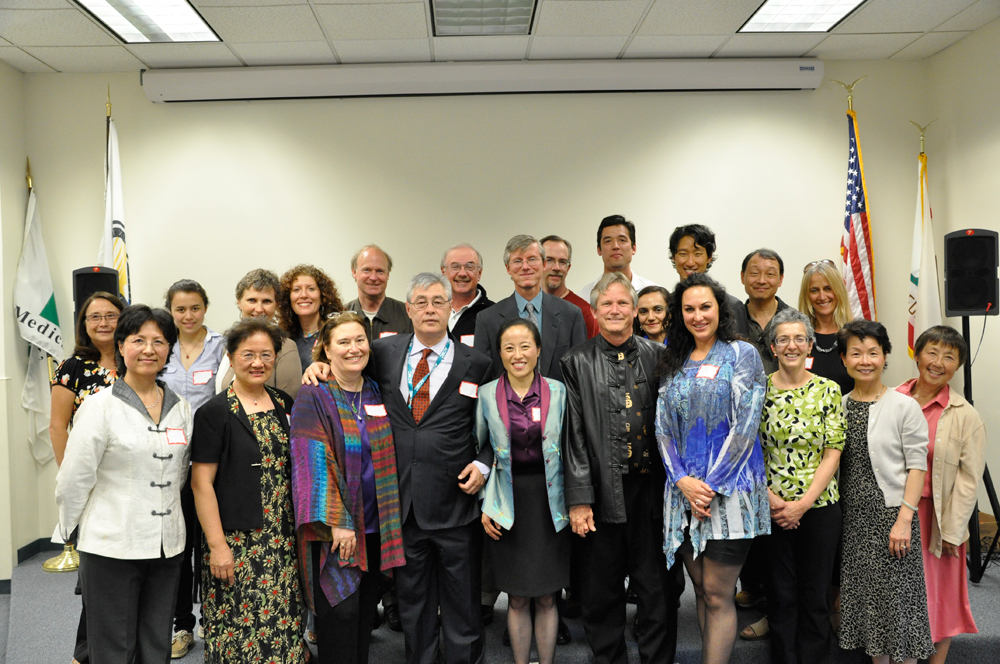A Base for Acupuncture Treatment, Consultation, Research, Residency and Teaching
By Mingyue Xu
Staff writer, reported in Oakland

Highland Hospital, Oakland – The First Integrative Medicine Division in a Public Teaching Hospital
Highland Hospital in Oakland, California
Although Traditional Chinese Medicine (TCM) has over a thousand years of history in China, it is not so easy to promote it into mainstream society in the United States. In Oakland, a team of TCM practitioners not only established the nation’s first integrative medicine division in a public teaching hospital, offering acupuncture specialty consultation and treatments for in-patients as well as providing acupuncture treatments in an outpatient clinic; but also developed the nation’s first hospital-based integrative TCM residency training program, learning along with western medical students, interns, residents, and attending doctors.
Highland Hospital in Oakland is a key component of Alameda County’s public hospital system. It is also the nation’s first public teaching hospital to establish the Division of Integrative Medicine (DIM) that utilizes acupuncture to treat and manage disease, and all that can be attributed to Dr. Amy Matecki (Ying Li), MD. Dr. Matecki studied Western Medicine in China, and is also an expert on acupuncture and TCM. In year 2000 Dr. Matecki came to Highland Hospital for her residency training, and later on was employed by the hospital for her outstanding performances. Once Dr. Matecki treated lymphedema in a cancer patient using acupuncture, and the outcome made acupuncture become widely recognized in the hospital and helped break the prejudicial barrier from the Western Medicine field towards Traditional Chinese Medicine. It wasn’t until six years ago when acupuncture was officially approved by the hospital and the Division of Integrative Medicine was born, thus making the dream of integrating Western and Traditional Chinese Medicine together in treating diseases come true for Dr. Matecki.
Indeed, how popular is Division of Integrative Medicine? Per Dr. Matecki, appointments are booked well into December. “It’s because acupuncture can work together with almost all other divisions, such as Pulmonology, Oncology, and even Adult Immunology, and has significant positive treatment outcome.” The acupuncture approach here not only focuses on in-patient specialty consultation, but it also develops and carries out research projects.
Dr. Matecki explained that in the United States, if one would want to become a doctor, residency is a must and essential to the development of professional experience, and is more readily available for Western medical students. Conversely, graduates from TCM universities do not have the same hospital residency opportunities; therefore, causing them to be lacking clinical experiences even if they could pass the board. With California Governor Brown’s support, the Division of Integrative Medicine at Highland Hospital is now a residency program receiving site for TCM students. In January this year, six students were accepted into the first term of TCM residency program. It is also worth mentioning that the majority of these students who love Traditional Chinese Medicine so passionately do not have any Chinese cultural background, but they are strongly attracted by traditional Chinese culture.
Although the Division of Integrative Medicine had been established for six years, only recently has Dr. Matecki begun to promote it publicly, hoping to bring more attention to this program. At the invitation of Dr. Xue Ma, who is the Director of International Development at International Center for Integrative Medicine (ICIM) and also a faculty member in the Division of Integrative Medicine at Highland, Cultural Consular Mr. Xiayong Xiao from the Consulate-General of the People’s Republic of China in San Francisco visited Highland Hospital, and highly appraised the program for introducing acupuncture treatment into America’s public teaching hospital.
Consular Xiao expressed full support for promoting the culture of Chinese medicine on behalf of the Consulate. Legalization of acupuncture already demonstrated a big step forward, and the effort now is to establish more integration of acupuncture treatment into public hospitals across the United States.
Another fact worth-mentioning is that even though there are dozens of staff in the Division of Integrative Medicine, everyone is on volunteer status. Dr. Colin Feeney, MD, who is Dr. Matecki’s former mentor, had been converted from being unknown about acupuncture to now acting as an advocate for acupuncture service. He mentioned that the biggest challenge remains to be insufficient funding, and is hoping there would be more funding to keep the acupuncture research projects running in a public teaching hospital.
With Dr. Matecki and her team’s efforts, the Division of Integrative Medicine at Highland Hospital is the first to formulate the qualification certification standards of Traditional Chinese Medicine physicians, of which the standards had been used as a sample model by many other hospitals. The Division is also the first to launch a 6-month research project composed of 560 cases to study the intensive care acupuncture clinical feasibility. Dr. Matecki acknowledges that the development of TCM is still under certain restrictions, especially for the fact that Chinese medicinal herbs haven’t been recognized yet and are only classified as nutritional supplements by the federal Food and Drug Administration (FDA). Her dream is to build a true TCM hospital to provide comprehensive and non-restrictive treatments for patients.



Leave A Comment